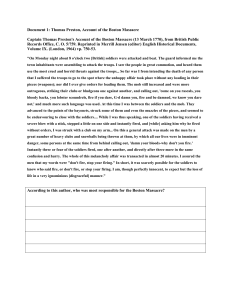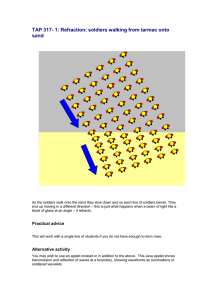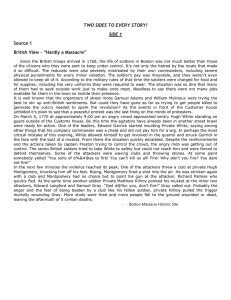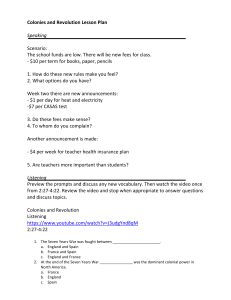Document 15523207
advertisement
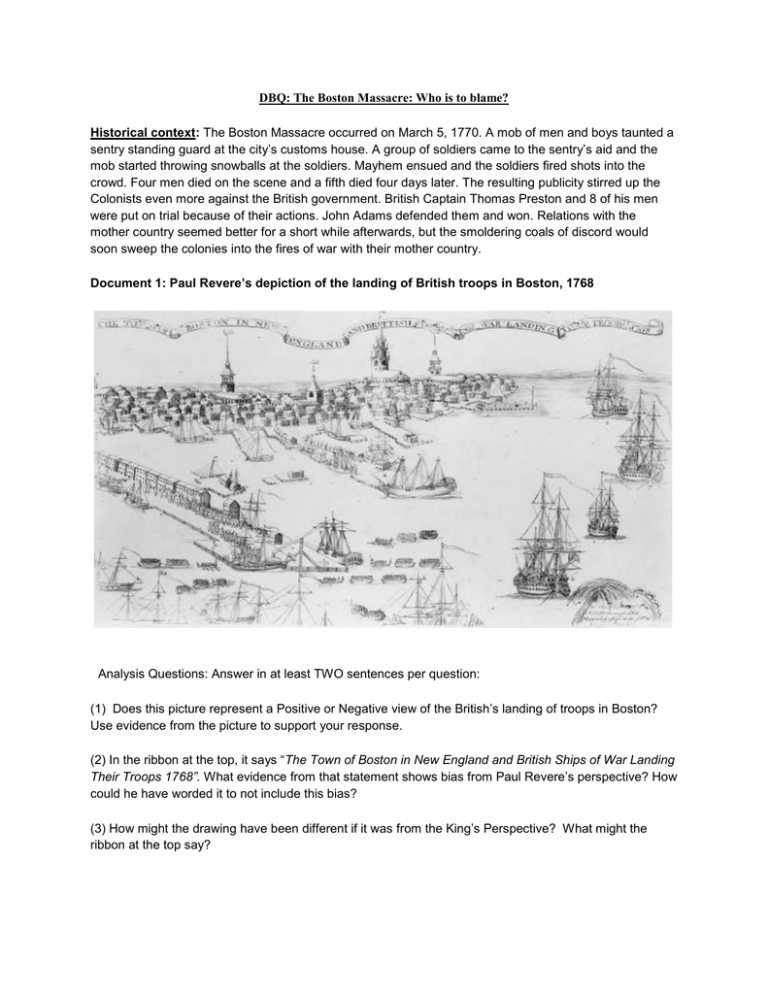
DBQ: The Boston Massacre: Who is to blame? Historical context: The Boston Massacre occurred on March 5, 1770. A mob of men and boys taunted a sentry standing guard at the city’s customs house. A group of soldiers came to the sentry’s aid and the mob started throwing snowballs at the soldiers. Mayhem ensued and the soldiers fired shots into the crowd. Four men died on the scene and a fifth died four days later. The resulting publicity stirred up the Colonists even more against the British government. British Captain Thomas Preston and 8 of his men were put on trial because of their actions. John Adams defended them and won. Relations with the mother country seemed better for a short while afterwards, but the smoldering coals of discord would soon sweep the colonies into the fires of war with their mother country. Document 1: Paul Revere’s depiction of the landing of British troops in Boston, 1768 Analysis Questions: Answer in at least TWO sentences per question: (1) Does this picture represent a Positive or Negative view of the British’s landing of troops in Boston? Use evidence from the picture to support your response. (2) In the ribbon at the top, it says “The Town of Boston in New England and British Ships of War Landing Their Troops 1768”. What evidence from that statement shows bias from Paul Revere’s perspective? How could he have worded it to not include this bias? (3) How might the drawing have been different if it was from the King’s Perspective? What might the ribbon at the top say? Document 2: Thomas Preston, Captain British of the army, account of the Boston Massacre, 1770 "On Monday night about 8 o'clock two [British] soldiers were attacked and beat. The guard informed me the town inhabitants were assembling to attack the troops. I saw the people in great commotion, and heard them use the most cruel and horrid threats against the troops... So far was I from intending the death of any person that I suffered the troops to go to the spot where the unhappy affair took place without any loading in their pieces (weapons); nor did I ever give orders for loading them. The mob still increased and were more outrageous, striking their clubs or bludgeons one against another, and calling out, 'come on you rascals, you bloody backs, you lobster scoundrels, fire if you dare, G-d damn you, fire and be damned, we know you dare not,' and much more such language was used. At this time I was between the soldiers and the mob. They advanced to the points of the bayonets, struck some of them and even the muzzles of the pieces, and seemed to be endeavouring to close with the soldiers.... While I was thus speaking, one of the soldiers having received a severe blow with a stick, stepped a little on one side and instantly fired, and [while] asking him why he fired without orders, I was struck with a club on my arm… On this a general attack was made on the men by a great number of heavy clubs and snowballs being thrown at them, by which all our lives were in imminent danger, some persons at the same time from behind calling out, 'damn your bloods-why don't you fire.' Instantly three or four of the soldiers fired, one after another, and directly after three more in the same confusion and hurry. The whole of this melancholy affair was transacted in almost 20 minutes. I assured the men that my words were "don't fire, stop your firing." In short, it was scarcely possible for the soldiers to know who said fire, or don't fire, or stop your firing. I am, though perfectly innocent, to expect but the loss of life in a very ignominious [disgraceful] manner." Analysis Questions: Answer in at least two sentences per question (1) Who is most responsible for the attack according to the author? Use TWO pieces of evidence from the source to support your opinion. (2) What event in Thomas Preston’s account do you think “started” the “massacre”? Use evidence from the text to support your answer. (3) Does Preston think he is to blame for this? How does he deflect or deny blame? Use evidence from the text to support your answer. Document 3: Paul Revere’s engraving of the Boston Massacre, 1770 Analysis Questions: Answer in at least two sentences per question (1) How might Paul Revere’s status a rebel/patriot influence your view of his engraving? Does this indicate bias on his part? (2) Compare and Contrast this engraving with Thomas Preston’s account in Document 2. What are two similarities? What are two differences? Document 4: Witness Jane Whitehouse’s trial deposition. “A Man came behind the Soldiers walked backwards and forward, encouraging them to fire. The Captain stood on the left about three yards. The man touched one of the Soldiers upon the back and said fire, by God I'll stand by you. He was dressed in dark colored clothes.... He did not look like an Officer. The man fired directly on the word and clap on the Shoulder. I am positive the man was not the Captain.... I am sure he gave no orders.... I saw one man take a chunk of wood from under his Coat throw it at a Soldier and knocked him. He fell on his face. His firelock'7 was out of his hand.... This was before any firing.” Analysis Question: Answer in at least two sentences (1) Do you think Jane Whitehouse is a reliable witness? Why or why not? What about her testimony tells you that she might not be biased to either side? Document 5: Witness Newton Prince, an African-American, a member of the South Church “Heard the Bell ring. Ran out. Came to the Chapel. Was told there was no fire but something better, there was going to be a fight. Some had buckets and bags and some Clubs. I went to the west end of the Town House where [there] were a number of people. I saw some Soldiers coming out of the Guard house with their Guns and running down one after another to the Custom house. Some of the people said let's attack the Main Guard, or the Centinel who is gone to King street. Some said for Gods sake don't lets touch the main Guard. I went down. Saw the Soldiers planted by the Custom l house two deep. The People were calling them Lobsters, daring 'em to fire 1, saying damn you, why don't you fire. I saw Capt. Preston out from behind 1 the Soldiers. In the front at the right. He spoke to some people. The Capt. stood between the Soldiers and the Gutter about two yards from the Gutter. alI saw two or three strike with sticks on the Guns. The People whilst striking on the Guns 1 cried fire, damn you fire. I have heard no Orders given to fire, only the people in general cried fire.” Analysis Questions: Answer in at least two complete sentences (1) Do you think Newton Prince is a reliable witness? Does his account differ from that Thomas Preston said in his statement (document 2)? Document 6: John Adams’ diary entry after defending the Captain Preston and his soldiers in their trial and winning their acquittal (not guilty). "The part I took in defense of captain Preston and the soldiers, procured me anxiety, and obloquy enough. It was, however, one of the most gallant, generous, manly and disinterested actions of my whole life, and one of the best pieces of service I ever rendered my country. Judgment of death against those soldiers would have been as foul a stain upon this country as the executions of the Quakers or witches, anciently.” Analysis Questions: Answer in at least two sentences (1) How does Adams feel about his participation in the trial? Provide an example from the text to support your answer (2) If the soldiers would have been found guilty, he compared it to the Salem Witch trials. What does he mean by this?
